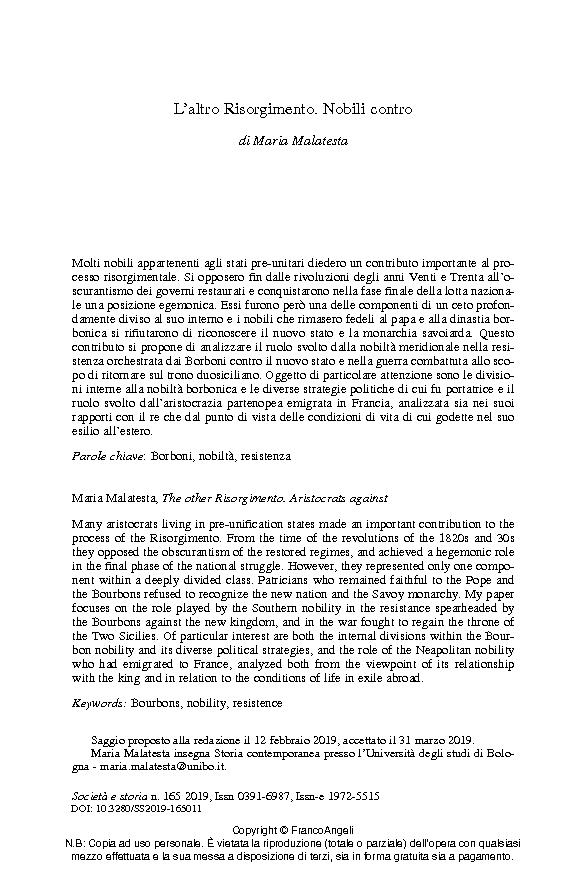L'altro Risorgimento : nobili contro
581-590 p.
Molti nobili appartenenti agli stati preunitari diedero un contributo importante al processo risorgimentale. Si opposero fin dalle rivoluzioni degli anni Venti e Trenta all'oscurantismo dei governi restaurati e conquistarono nella fase finale della lotta nazionale una posizione egemonica. Essi furono però una delle componenti di un ceto profondamente diviso al suo interno e i nobili che rimasero fedeli al papa e alla dinastia borbonica si rifiutarono di riconoscere il nuovo stato e la monarchia savoiarda. Questo contributo si propone di analizzare il ruolo svolto dalla nobiltà meridionale nella resistenza orchestrata dai Borboni contro il nuovo stato e nella guerra combattuta allo scopo di ritornare sul trono duosiciliano.
Oggetto di particolare attenzione sono le divisioni interne alla nobiltà borbonica e le diverse strategie politiche di cui fu portatrice e il ruolo svolto dall'aristocrazia partenopea emigrata in Francia, analizzata sia nei suoi rapporti con il re che dal punto di vista delle condizioni di vita di cui godette nel suo esilio all'estero. [Testo dell'editore].
Many aristocrats living in preunification states made an important contribution to the process of the Risorgimento. From the time of the revolutions of the 1820s and 30s they opposed the obscurantism of the restored regimes, and achieved a hegemonic role in the final phase of the national struggle. However, they represented only one component within a deeply divided class. Patricians who remained faithful to the Pope and the Bourbons refused to recognize the new nation and the Savoy monarchy. My paper focuses on the role played by the Southern nobility in the resistance spearheaded by the Bourbons against the new kingdom, and in the war fought to regain the throne of the Two Sicilies.
Of particular interest are both the internal divisions within the Bourbon nobility and its diverse political strategies, and the role of the Neapolitan nobility who had emigrated to France, analyzed both from the viewpoint of its relationship with the king and in relation to the conditions of life in exile abroad. [Publisher's text].
Is part of
Società e storia : 165, 3, 2019-
Articles from the same issue (available individually)
-
Information
ISSN: 1972-5515
DISCIPLINES
KEYWORDS
- Borboni, nobiltà, resistenza
- Bourbons, nobility, resistence



